|
|
|
Sort Order |
|
|
|
Items / Page
|
|
|
|
|
|
|
| Srl | Item |
| 1 |
ID:
159973
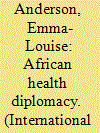

|
|
|
|
|
| Summary/Abstract |
Health crises pose fundamental challenges to international relations and have been a major focal point of contests for global influence, particularly in the global South, where such crises are most acute. This necessitates a focus on the arenas of global health diplomacy and the power struggles that emanate from them, including the often-overlooked agency of African actors within these arenas. Drawing upon a total of 3 months of fieldwork in 2007 and 2014 that included 68 key-informant interviews, participant observations, and informal discussions, this article interrogates the mechanics of multi-stakeholder health diplomacy in Malawi, where a near-permanent state of health crisis and underdevelopment has generated extreme dependency on external health assistance. This article conceptualises shadow diplomacy as the informal networks and channels of influence that run parallel to, but are not recognised as part of, formal diplomacy. This concept reveals how health is key to struggles for leverage by both international and local actors, giving rise to informal and subversive manifestations of diplomacy in the ‘shadows’. It enables us to understand not only how Western powers consolidate and obscure their enduring power but also how the ‘shadows’ benefit African political elites as they leverage their dependency to subvert global power structures for their own ends. It disrupts the external/internal binary of international donors/African states and reveals that these are not monolithic actors but instead comprising complex individuals with multi-faceted motivations and divided loyalties.
|
|
|
|
|
|
|
|
|
|
|
|
|
|
|
|
| 2 |
ID:
151190
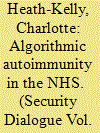

|
|
|
|
|
| Summary/Abstract |
This article explores the extension of counter-radicalisation practice into the National Health Service (NHS). In the 2011 reformulation of the UK Prevent strategy, the NHS became a key sector for the identification and suppression of ‘radicalisation’. Optometrists, dentists, doctors and nurses have been incorporated into counter-terrorism and trained to report signs of radicalisation in patients and staff. This article explores how calculative modalities associated with big data and digital analytics have been translated into the non-digital realm. The surveillance of the whole of the population through the NHS indicates a dramatic policy shift away from linear profiling of those ‘suspect communities’ previously considered vulnerable to radicalisation. Fixed indicators of radicalisation and risk profiles no longer reduce the sample size for surveillance by distinguishing between risky and non-risky bodies. Instead, the UK government chose the NHS as a pre-eminent site for counter-terrorism because of the large amount of contact it has with the public. The UK government is developing a novel counter-terrorism policy in the NHS around large-N surveillance and inductive calculation, which demonstrates a translation of algorithmic modalities and calculative regimes. This article argues that this translation produces an autoimmune moment in British security discourse whereby the distinction between suspicious and non-suspicious bodies has collapsed. It explores the training provided to NHS staff, arguing that fixed profiles no longer guide surveillance: rather, surveillance inductively produces the terrorist profile.
|
|
|
|
|
|
|
|
|
|
|
|
|
|
|
|
| 3 |
ID:
124204
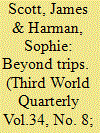

|
|
|
|
|
| Publication |
2013.
|
| Summary/Abstract |
The current round of World Trade Organization (WTO) negotiations-the Doha Round-has significant implications for global health which have received insufficient attention from the global health community. All too often the health implications of global trade agreements are examined only after their conclusion, and are concerned only with intellectual property rights. This paper seeks to move beyond this narrow focus and elucidate the wider health implications of the Doha Round. It explores the negative effect of the Round on state capacity to provide and regulate health services in low-income countries, and the impact it will have on livelihoods among the poor and their ability to access health services. Overall the paper makes the case for greater engagement from the health community with the wto and the Doha Round negotiations beyond the customary focus on intellectual property rights.
|
|
|
|
|
|
|
|
|
|
|
|
|
|
|
|
| 4 |
ID:
150581
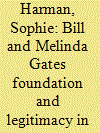

|
|
|
|
|
| Summary/Abstract |
The Bill and Melinda Gates Foundation brings to light the legitimacy problem with global philanthropy. The legitimacy problem here is twofold: first, with regard to the criteria used to assess the presence or absence of legitimacy in global governance; and, second, how analysis of legitimacy does not fully account for how we understand the legitimate basis of rule drawn from private wealth. This article begins to address this lacuna by analyzing the legitimacy of an actor that wields considerable authority in the field of global health politics and has growing prominence in contemporary global governance, the Bill and Melinda Gates Foundation.
|
|
|
|
|
|
|
|
|
|
|
|
|
|
|
|
| 5 |
ID:
172806
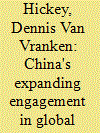

|
|
|
|
|
| Summary/Abstract |
FOR MOST OF THE NINETEENTH AND MUCH OF THE TWENTIETH CENTURY, CHINA was called, "the sick man of Asia (东亚病夫, dong ya bing fu)."1 But those days are over. As President Xi Jinping observed, "China has bid farewell to the problems that plagued its people for thousands of years, including hunger, shortages and poverty" (Yu 2019, 19). As described below, China is now one of the world's top economic, political and military powers.
|
|
|
|
|
|
|
|
|
|
|
|
|
|
|
|
| 6 |
ID:
128886
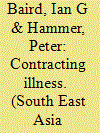

|
|
|
|
|
| Publication |
2013.
|
| Summary/Abstract |
Without much attention to local context, global health policy experiments are being conducted on vulnerable indigenous populations. This article details the history of a development-bank-funded experiment to contract out public health services in Cambodia's north-eastern province of Ratanakiri. The case study highlights the difficulties that flow from improper planning and implementation, as well as the distorting effects that narrowly defined contract performance measures can have on the health of the population as a whole. Progress in global health will not be possible if local context and voices continue to be underappreciated.
|
|
|
|
|
|
|
|
|
|
|
|
|
|
|
|
| 7 |
ID:
144241
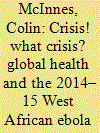

|
|
|
|
|
| Summary/Abstract |
This article examines why the 2014–15 outbreak of Ebola in West Africa, which subsequently spread more widely, was understood as a crisis. It begins from the basis that there was nothing ‘natural’ about it being considered a crisis; rather it was socially constructed as such. Specifically it suggests that the outbreak could be understood as a crisis because of the way in which it resonated with the global health narrative. The article examines how the elements which constitute this narrative – the effects of globalisation, the emergence of new risks and the requirement for new political responses – are fundamental to how Ebola was understood as a crisis.
|
|
|
|
|
|
|
|
|
|
|
|
|
|
|
|
| 8 |
ID:
160882
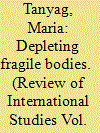

|
|
|
|
|
| Summary/Abstract |
In a crisis-prone world, the number of internally displaced persons (IDPs) uprooted by both armed conflicts and environmental disasters has drastically increased and displacement risks have intensified. Despite the growing attention within global security and development agendas to sexual and reproductive health and rights (SRHR), there remain striking gaps in addressing SRHR in crisis situations, particularly among IDP women and girls. This article examines the continuum between social reproduction in times of crisis and the material and ideological conditions that restrict women’s bodily autonomy in everyday life. Using the case of the Philippines where millions of people are routinely affected by conflict and disaster-induced displacements, it argues that the failure to recognise the centrality of women’s health and bodily autonomy not only hinders the sustainable provision of care and domestic labour during and after crisis, but also fundamentally constrains how security is enacted within these spaces. Thus, the article highlights an urgent need to rethink the gendered political economy of crisis responses as a building block for stemming gendered violence and depletion of social reproductive labour at the household, state, and global levels.
|
|
|
|
|
|
|
|
|
|
|
|
|
|
|
|
| 9 |
ID:
144240
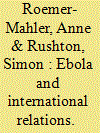

|
|
|
|
|
| Summary/Abstract |
The outbreak of Ebola Virus Disease (EVD) that gripped Liberia, Guinea and Sierra Leone through much of 2014 and 2015 was an enormous and in many ways unprecedented health emergency. Yet the outbreak was not only a global health event – it was also a global political event. In this introduction to the special issue we discuss the contribution that International Relations scholarship can make to analysing and understanding the Ebola outbreak and the global response to it. We group our comments around four key themes: (1) allocating responsibility in a diffuse global health governance system; (2) the causes and effects of Ebola being perceived as a global crisis; (3) the downsides of a security-driven approach to global health emergencies; and (4) issues of inequality both between and within countries, including those around gender, resources and power.
|
|
|
|
|
|
|
|
|
|
|
|
|
|
|
|
| 10 |
ID:
170837


|
|
|
|
|
| Summary/Abstract |
Every U.S. President in recent decades has had to respond to at least one pandemic disease. Political leadership has proven decisive. In the coming years, U.S. foreign policy will face at least three inter-related issues: today's major pandemics of AIDS, TB, and Malaria; future outbreaks with the potential to become pandemics; and rising risk from infectious diseases associated with climate change. A review of epidemiologic data shows global progress on each issue is threatened. A coordinated U.S. effort, across agencies and engaged with national and multilateral partners, could save lives and address significant foreign policy interests. Such an effort could boost economic prosperity by reducing disease-related lost productivity, which we estimate at $1.7 trillion, with returns to investment in pandemic-related global health efforts averaging 17–20 to 1. Foreign policy focus on pandemics could also address economic and social inequalities and support climate adaptation and mitigation. Pandemic-related global health spending is 0.19% of the U.S. budget—a figure that has been flat in recent years even with growing needs and significant potential gains from investment.
|
|
|
|
|
|
|
|
|
|
|
|
|
|
|
|
| 11 |
ID:
187175
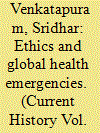

|
|
|
|
|
| Summary/Abstract |
The global response to the COVID-19 pandemic has been marred by a widespread failure to embed ethics in policymaking. The consequences have included vaccine hoarding by rich countries and the deaths of millions of people around the world. Governments have followed a simplistic narrative of science and finance teaming up against a virus and delivering a silver bullet in the form of a new vaccine, rather than recognizing that a health emergency reflects patterns of inequality within and across countries and other social factors that need to be addressed. Given the interconnection and interdependency of globalization, ethics must be incorporated in global health policy as a primary consideration, not an afterthought.
|
|
|
|
|
|
|
|
|
|
|
|
|
|
|
|
| 12 |
ID:
168247
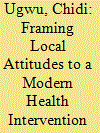

|
|
|
|
|
| Summary/Abstract |
Interventionists usually blame cultural factors and traditional attitudes for non-compliance of target populations, a framework Didier Fassin terms as culturalism. Despite their efforts, what the Roll Back Malaria employees find in southeastern Nigeria is a ‘troubling’ nonchalance towards the programme because target populations’ perceptions of malaria differ from the donor/programme perspective. The RBM employees cast the local attitude as culturalism, accordingly framing their exhortations in terms of this discourse. How the Roll Back Malaria employees deployed culturalism to fit with the neoliberal individualizing framework of current international health practices is one more nuanced analytical perspective the article brings to intervention literature.
|
|
|
|
|
|
|
|
|
|
|
|
|
|
|
|
| 13 |
ID:
180376
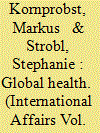

|
|
|
|
|
| Summary/Abstract |
Do global health institutions keep up with globalization forces? We contend that they seriously lag behind. While medical knowledge becomes more and more refined in showing how diseases spread globally, the political order meant to address this problem is barely global. It is global in terms of the promises it makes in declarations and even legally binding instruments (institutional foreground). But many entrenched political practices of interaction do not keep these promises (institutional background). We explain this with the dominance of a traditional diplomatic ‘feel of the game’ in which often narrowly defined national interests, positioning battles among states, and a subordination of global health under considerations of international security and economics prevail. Based on this diagnosis, we discuss three scenarios for the further evolution of the global health order: (1) the persistence of current institutions, (2) revisions of the institutional foreground and persistence of the background, and (3) a qualitative break that makes amendments to both. While the COVID-19 crisis provides openings for the third and, even more so, the second one, the current upheavals in the liberal constellation of orders makes the first scenario the most likely one.
|
|
|
|
|
|
|
|
|
|
|
|
|
|
|
|
| 14 |
ID:
187527


|
|
|
|
|
| Summary/Abstract |
This article examines how the ‘health security’ paradigm positions health-related human rights as subordinate to national security concerns. As a consequence, health is viewed instrumentally, shifting the global health response towards maintaining national security rather than upholding human rights. We trace here how both the World Health Organization (WHO) and the United Nations Security Council have approached global health crises, evolving across infectious disease responses to HIV/AIDS, SARS, Ebola and COVID-19. While the Security Council has come to address human rights in select public health contexts, we see that the securitisation of human rights in times of crisis can pose severe limits on individual rights, failing to develop global health solidarity through a commitment to broader health objectives such as Universal Health Coverage. We conclude that the Security Council and the WHO should collaborate towards a rights-based response to COVID-19 that prioritises individual human rights alongside national security concerns, addressing underlying inequities in the global response to infectious disease.
|
|
|
|
|
|
|
|
|
|
|
|
|
|
|
|
| 15 |
ID:
187253
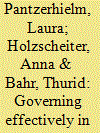

|
|
|
|
|
| Summary/Abstract |
This article approaches the field of global health governance from the vantage point of shared discourses and norms on the good governance of governance amongst multiple international organisations (IOs). Conceptually, we introduce metagovernance norms as constitutive, reflexive beliefs concerned with institutional order and IO interactions in a given governance field. We argue that such norms are entangled with causal beliefs and problem perceptions that form part of contingent, contested repertoires of knowledge. Moreover, we illustrate how IO ‘expert’ groups form an authoritative subject position from which truth claims about governance are advanced. Empirically, we trace metagovernance norms in discourse(s) amongst eight health IOs since the 1970s. We show how metagovernance norms have been constructed around competing beliefs about governance ‘effectiveness’ and problem perceptions concerned with different forms of ‘complexity’. Our research demonstrates that discourses on institutional order in global health are shaped by metagovernance norms drawing on historically-specific knowledge repertoires.
|
|
|
|
|
|
|
|
|
|
|
|
|
|
|
|
| 16 |
ID:
188903


|
|
|
|
|
| Summary/Abstract |
Track Two Diplomacy, a form of facilitated informal and unofficial dialogues between conflicting parties, has become a well-established form of international conflict resolution. This paper seeks to explore whether the techniques and practices of Track Two could be applied in a new setting beyond international armed conflicts: public health. Global society continues to grapple with the devastating effects of the COVID-19 pandemic, systemic racism, and climate change, among other pressing public health issues that can not only exacerbate but also create new conflicts that negatively affect communities. Innovative and interdisciplinary approaches are needed more than ever. We synthesize literature from both Track Two and public health fields to present a conceptual framework that posits whether and how such concepts as the “problem-solving workshop,” “transfer,” “reflective practice” and others might support parties involved in divisive, intractable, visible, and invisible conflicts which currently mark the public health space.
|
|
|
|
|
|
|
|
|
|
|
|
|
|
|
|
| 17 |
ID:
188913
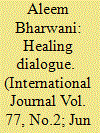

|
|
|
|
|
| Summary/Abstract |
Track Two Diplomacy, a form of facilitated informal and unofficial dialogues between conflicting parties, has become a well-established form of international conflict resolution. This paper seeks to explore whether the techniques and practices of Track Two could be applied in a new setting beyond international armed conflicts: public health. Global society continues to grapple with the devastating effects of the COVID-19 pandemic, systemic racism, and climate change, among other pressing public health issues that can not only exacerbate but also create new conflicts that negatively affect communities. Innovative and interdisciplinary approaches are needed more than ever. We synthesize literature from both Track Two and public health fields to present a conceptual framework that posits whether and how such concepts as the “problem-solving workshop,” “transfer,” “reflective practice” and others might support parties involved in divisive, intractable, visible, and invisible conflicts which currently mark the public health space.
|
|
|
|
|
|
|
|
|
|
|
|
|
|
|
|
| 18 |
ID:
145532
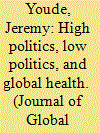

|
|
|
|
|
| Summary/Abstract |
It has become commonplace to argue that global health has ascended from “low politics” to the ranks of “high politics” in international relations—those issues of existential importance to the state and which concern its very survival. Despite its ubiquity, the actual substance of such a shift in the framing of global health is largely unexamined. In this article, I argue that empirical evidence belies the idea that global health is a “high politics” issue. This dichotomy makes little sense, and efforts to reframe global health as a “high politics” or securitized issue rarely succeed. While it is undoubtedly true that global health has received significantly greater attention from the international community over the past twenty-five to thirty years, that attention does not spring from global health being reframed as a “high politics” issue for states.
|
|
|
|
|
|
|
|
|
|
|
|
|
|
|
|
| 19 |
ID:
104692


|
|
|
| 20 |
ID:
082556
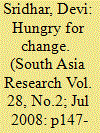

|
|
|
|
|
| Publication |
2008.
|
| Summary/Abstract |
The World Bank has become the largest financial contributor to health-related and nutrition projects, committing more than $1 billion annually towards the health, nutrition and population sector. This article examines how the World Bank addressed malnutrition in Tamil Nadu and discusses the consequences of this approach for the Bank's projects and target communities. Using the case study of the Tamil Nadu Integrated Nutrition Project (TINP), it is argued that the World Bank nutrition package, now implemented in several countries, might not be effective in extremely poor and destitute communities because it does not address the underlying social causes of malnutrition. The final section of the article goes 'inside' the Bank to examine two institutional drivers that could explain the promotion of the TINP approach to undernutrition
|
|
|
|
|
|
|
|
|
|
|
|
|
|
|
|
|
|
|
|
|